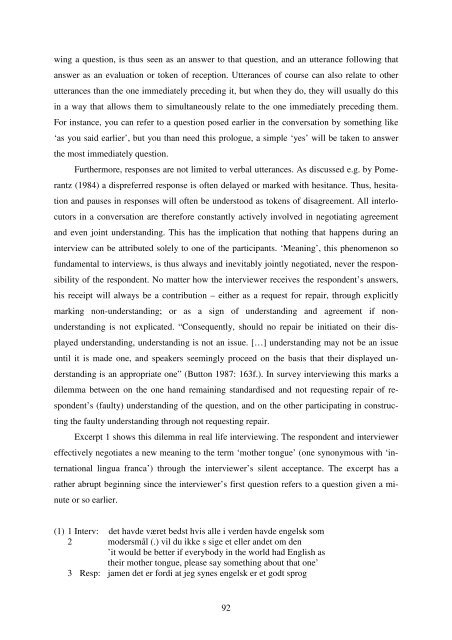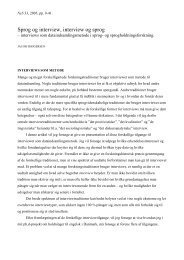Hør dog hvad de siger - Note-to-Self: Trials & Errors
Hør dog hvad de siger - Note-to-Self: Trials & Errors
Hør dog hvad de siger - Note-to-Self: Trials & Errors
You also want an ePaper? Increase the reach of your titles
YUMPU automatically turns print PDFs into web optimized ePapers that Google loves.
wing a question, is thus seen as an answer <strong>to</strong> that question, and an utterance following that<br />
answer as an evaluation or <strong>to</strong>ken of reception. Utterances of course can also relate <strong>to</strong> other<br />
utterances than the one immediately preceding it, but when they do, they will usually do this<br />
in a way that allows them <strong>to</strong> simultaneously relate <strong>to</strong> the one immediately preceding them.<br />
For instance, you can refer <strong>to</strong> a question posed earlier in the conversation by something like<br />
‘as you said earlier’, but you than need this prologue, a simple ‘yes’ will be taken <strong>to</strong> answer<br />
the most immediately question.<br />
Furthermore, responses are not limited <strong>to</strong> verbal utterances. As discussed e.g. by Pome-<br />
rantz (1984) a dispreferred response is often <strong>de</strong>layed or marked with hesitance. Thus, hesita-<br />
tion and pauses in responses will often be un<strong>de</strong>rs<strong>to</strong>od as <strong>to</strong>kens of disagreement. All interlo-<br />
cu<strong>to</strong>rs in a conversation are therefore constantly actively involved in negotiating agreement<br />
and even joint un<strong>de</strong>rstanding. This has the implication that nothing that happens during an<br />
interview can be attributed solely <strong>to</strong> one of the participants. ‘Meaning’, this phenomenon so<br />
fundamental <strong>to</strong> interviews, is thus always and inevitably jointly negotiated, never the respon-<br />
sibility of the respon<strong>de</strong>nt. No matter how the interviewer receives the respon<strong>de</strong>nt’s answers,<br />
his receipt will always be a contribution – either as a request for repair, through explicitly<br />
marking non-un<strong>de</strong>rstanding; or as a sign of un<strong>de</strong>rstanding and agreement if non-<br />
un<strong>de</strong>rstanding is not explicated. “Consequently, should no repair be initiated on their dis-<br />
played un<strong>de</strong>rstanding, un<strong>de</strong>rstanding is not an issue. […] un<strong>de</strong>rstanding may not be an issue<br />
until it is ma<strong>de</strong> one, and speakers seemingly proceed on the basis that their displayed un-<br />
<strong>de</strong>rstanding is an appropriate one” (But<strong>to</strong>n 1987: 163f.). In survey interviewing this marks a<br />
dilemma between on the one hand remaining standardised and not requesting repair of re-<br />
spon<strong>de</strong>nt’s (faulty) un<strong>de</strong>rstanding of the question, and on the other participating in construc-<br />
ting the faulty un<strong>de</strong>rstanding through not requesting repair.<br />
Excerpt 1 shows this dilemma in real life interviewing. The respon<strong>de</strong>nt and interviewer<br />
effectively negotiates a new meaning <strong>to</strong> the term ‘mother <strong>to</strong>ngue’ (one synonymous with ‘in-<br />
ternational lingua franca’) through the interviewer’s silent acceptance. The excerpt has a<br />
rather abrupt beginning since the interviewer’s first question refers <strong>to</strong> a question given a mi-<br />
nute or so earlier.<br />
(1) 1 Interv: <strong>de</strong>t hav<strong>de</strong> været bedst hvis alle i ver<strong>de</strong>n hav<strong>de</strong> engelsk som<br />
2 mo<strong>de</strong>rsmål (.) vil du ikke s sige et eller an<strong>de</strong>t om <strong>de</strong>n<br />
’it would be better if everybody in the world had English as<br />
their mother <strong>to</strong>ngue, please say something about that one’<br />
3 Resp: jamen <strong>de</strong>t er fordi at jeg synes engelsk er et godt sprog<br />
92



